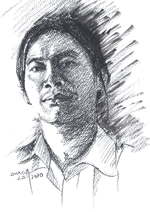
COMMENTARY
| By AUNG ZAW | Thursday, March 31, 2011 |
If you read The New Light of Myanmar today hoping to find signs of change in Burma, you can be forgiven for feeling a bit despondent. Ex-Gen Thein Sein's inaugural speech as the country's newly minted president gave no indication that his government—sworn in just yesterday—has any intention of breaking with the policies of the past two decades.
 |
| Aung Zaw is founder and editor of the Irrawaddy magazine. He can be reached at [email protected]. |
Among other things, Thein Sein laid out his foreign policy in his address to Parliament. Vowing to stand firm as a respected member of the global community, he invited nations wishing to see “democracy flourish” in Burma to cooperate with his government. To this end, he called on foreign governments to end “various forms” of pressure on Burma, “including assistance and encouragement to the anti-government groups and economic manipulations.”
But Thein Sein, a staunch loyalist of Snr-Gen Than Shwe, the head of the now-dissolved State Peace and Development Council, is not likely to get his wish.
Shortly after his speech, US State Department Acting Deputy Spokesman Mark Toner dismissed the nominal transfer of authority in Burma from military to civilian figures as “immaterial.” Military leaders are still in control, he said, meaning that sanctions would remain in place, even as the Obama administration continues to try to engage the Burmese authorities.
Toner told Voice of America that the US urges the Burmese authorities to release all political prisoners, recognize the legitimacy of Aung San Suu Kyi’s National League for Democracy party, and enter into a genuine, inclusive, dialogue with all democratic and ethnic-based opposition groups “as a first step toward reconciliation.”
There was nothing in Thein Sein's speech to suggest that any of this would happen anytime in the foreseeable future. So Burma's longstanding pariah status in the international community looks set to continue.
It's doubtful that Thein Sein will ever exercise his executive power to free Burma's more than 2,000 prisoners of conscience, grant an amnesty for political dissidents, recognize the existence of opposition parties that decided not to contest in the 2010 election and order an end to the army's aggression toward ethnic groups. Even if he wanted to do any of these things, it really isn't in his power to do anything without the approval of his boss, Than Shwe.
Although Than Shwe has slipped into the shadows and is no longer the face of the ruling military clique, it is clear that he is still very much in command. As the de facto leader, he will continue to steer the country along the same course as he has since first taking the helm in 1992.
What this means in concrete terms is that there will be no compromise with the West. Instead, China will continue to exercise growing influence over Burma as its rulers look to Beijing as their chief source of foreign support.
To underline this fact, Jia Qinglin, the fourth highest-ranking leader in the Chinese politburo hierarchy, will be visiting Burma soon to meet the country's new president and senior government officials. China has already invested heavily in Burma's “transition” by endorsing the outcome of last year's bogus election, so it should come as no surprise that it is eager to lend as much legitimacy as it can to Thein Sein's puppet government.
So where does this leave Western policy makers, particularly in Washington, which has taken the lead in imposing tough penalties on the Burmese regime? Having already ruled out the possibility of lifting sanctions under the current circumstances, the US may now consider even more stringent measures, including more targeted sanctions. This could happen even if blanket sanctions are eventually lifted.
Another thing the US can do is appoint a full-time special representative and policy coordinator on Burma, as authorized by the 2008 JADE Act.
1 | 2 
|
||
|
||
|
||
|
||
|
||
|
||
|
||
|
||


Thailand Hotels
Bangkok Hotels
China Hotels
India Hotels

|